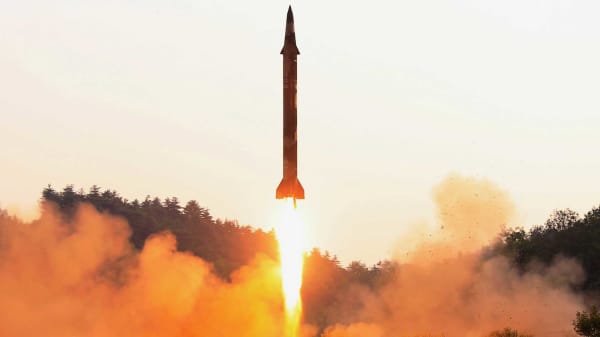In the near term, what should the U.S. do? First, stop issuing rhetoric. Both North Korea and South Korea well understand that the U.S. will not tolerate North Korean aggression. By responding to every North Korean advance we are trumpeting Kim's song and serving his ends. He would like the U.S. to sound bellicose and also to be frightened. So, no more public pronouncements.
Secondly, strengthen South Korea's defenses - anti-missiles, more striking power, and better capacities to take on the North Korean threats of chemical and biological warfare, and Special Forces infiltration.
Third, seek quiet, direct dialogue with the North, just to be sure there is no misunderstanding of our resolve.
In the longer term there are three serious options: Stand fast, go home, or seek reunification on our terms. Nothing the North Koreans can do will hurt us directly, without imperiling their own survival. So, just cordon off the North to prevent nuclear smuggling, improve our own missile defenses, and work to stabilize the tensions. Let North Korea continue to struggle, isolated and poor. Time is on our side; Kim will never know when we might develop some super-weapon or key intelligence enablers that could strip away his security and secrecy, rendering him and his regime vulnerable in a way it isn't today.
If we are terribly concerned about their nuclear weaponry, we could enter into the kind of direct dialogue the Russians and Chinese are urging; this would likely result in North Korea demanding the U.S. abandon its presence in and commitments to the South in return for a fundamentally unverifiable promise to give up its nuclear program. This would be a poor tradeoff - it would most likely result in Japan deciding to build its own nuclear deterrent, and undercut U.S. security guarantees worldwide.
Third, while preserving our security commitment to the South, work privately to encourage reunification - "one country-two systems" - under terms favorable to the South and with our continued, long-term presence. The two Korea's should talk, and so long as we are steadfast in our support for the South, perhaps Kim himself can find a formula to "come in from the cold" and join the world community, over a decades-old long transition period. He wants to preserve his rule, and he wants no domination by China.
But there is one caution: In the late 1930's the U.S. cut-off scrap iron and oil shipments to Japan. It was meant as a form of pressure to constrain Japan's Asian aggression. But for Japan, it meant that war with the U.S. became necessary. There are limits to the efficacy of economic pressures; the economic destruction of North Korea, were it possible, is unlikely to compel its surrender and more likely to convince Kim he has little to lose from more extreme military action.
We need a long-term strategy to stabilize and reduce tension on the Korean Peninsula - and we should resist the urge to seek an immediate solution, whether through bluster or economic destruction of the North.
Commentary by Retired General Wesley Clark, a former NATO Supreme Allied Commander and a Senior Fellow at the UCLA Burkle Center. Follow him on Twitter @
GeneralClark.
For more insight from CNBC contributors, follow
@CNBCopinion
on Twitter.




